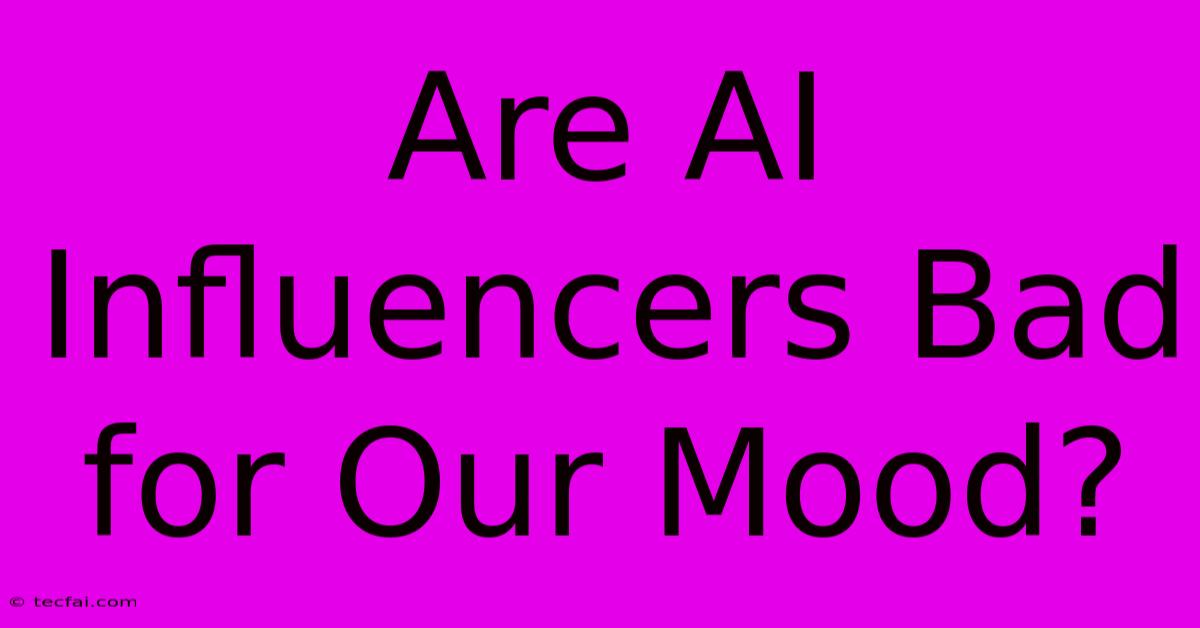Are AI Influencers Bad For Our Mood?

Discover more detailed and exciting information on our website. Click the link below to start your adventure: Visit Best Website tecfai.com. Don't miss out!
Table of Contents
Are AI Influencers Bad for Our Mood? The Rise of Synthetic Social Media and Its Impact on Mental Well-being
The world of social media is constantly evolving, with new trends and technologies emerging all the time. One of the latest developments is the rise of AI influencers – virtual personas created using artificial intelligence. These digital beings can be incredibly realistic, often boasting flawless features and engaging personalities. While they offer a unique and potentially beneficial way to interact with brands and content, there are growing concerns about their potential impact on our mental well-being.
The Allure of Perfection: A Double-Edged Sword
AI influencers present a curated, often idealized version of themselves. They are designed to be visually appealing, with perfect features and flawless skin. This can create a sense of pressure and comparison, leading to feelings of inadequacy and insecurity. We are bombarded with images of unrealistic beauty standards, which can negatively affect our self-esteem and body image.
The problem lies in the unrealistic expectations these digital personas set. While we understand that human influencers are carefully crafting their online presence, the AI-generated nature of these digital beings can make it harder to recognize the curated and manufactured nature of their image. This can contribute to a feeling of "keeping up with the Joneses" and lead to a constant desire to achieve an impossible standard of perfection.
The Fear of Missing Out (FOMO) and Social Comparison
AI influencers are often used to promote specific brands and products, contributing to a constant influx of advertisements and consumerism. This can exacerbate feelings of fear of missing out (FOMO), leading users to feel pressured to purchase products they don't need or want. The constant stream of "perfect" lives and experiences can create a sense of inadequacy and dissatisfaction with our own lives.
Furthermore, social comparison is inevitable in the digital age. Seeing the seemingly effortless and happy lives of AI influencers can lead to comparisons with our own realities, leading to feelings of envy and dissatisfaction. This can be especially damaging for individuals already struggling with low self-esteem or body image issues.
The Need for Authenticity and Real-World Connection
While AI influencers can offer a unique and engaging form of entertainment, it's crucial to recognize their limitations and potential drawbacks. Their curated and manufactured nature can contribute to unrealistic expectations and a distorted perception of reality.
It's essential to prioritize real-world connections and genuine human interactions. Social media should be used to foster meaningful connections and positive experiences, not to compare ourselves to unattainable ideals.
We should be mindful of the content we consume and actively choose to follow accounts that promote authenticity and positive self-image.
The future of social media is likely to involve an increasing presence of AI influencers. However, by understanding their potential impact and prioritizing real-world connections, we can navigate this new landscape with greater awareness and protect our mental well-being.

Thank you for visiting our website wich cover about Are AI Influencers Bad For Our Mood?. We hope the information provided has been useful to you. Feel free to contact us if you have any questions or need further assistance. See you next time and dont miss to bookmark.
Featured Posts
-
Megan Fox Buntis Sa Pangalawang Anak
Nov 12, 2024
-
Tesla Rally Continues Shares Up 9
Nov 12, 2024
-
Tesla Stock Pops 9 On Election Rally
Nov 12, 2024
-
Shots Fired At Spirit Plane In Haiti
Nov 12, 2024
-
Tua Dolphins Top Rams Playoff Race Continues
Nov 12, 2024
